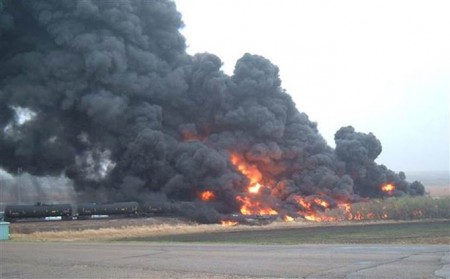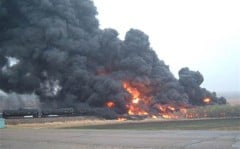DOT delivers industry wish list on bomb trains

CR: Jennifer Willis
View more images on our Flickr site
Read: “Obama Administration Leaves Explosive Oil Trains on the Rails for Years.”
With the exception of advanced braking systems required for trains over 70 cars long by 2021, the final rule reads off like a rail and oil industry wish list. Dangerous tank cars will ride the rails for years to come. The DOT could have gone further, implementing National Transportation Safety Board recommendations for an “aggressive” milestone based schedule, providing a public reporting mechanism on industry progress and retrofitted tank cars with adequate fire protection.
The feds handed industry a pass to transport flammable and volatile crude oil in dangerous tank cars until 2025. Nearly 10 years from today! Avoiding the “financial burden” on the oil and rail industries’ shareholders, the Department of Transportation and Office of Management and Budget opted, instead, to place the burden of risk on communities from Albany to Seattle.
Most troubling, proposals to notify communities of dangerous cargo were shelved due to “security and proprietary business” concerns. Instead, the railroads will hand out a phone number and say, “Call us!” We believe first responders have a right to know the movements of dangerous cargo to protect themselves and their communities from harm.
How can we be shocked by this rule? This is the dangerous, business-as-usual model of the fossil fuel industry. But, we are dependent on oil, some say, so what is the alternative?
There are new developments and opportunities to quickly transition to a low carbon economy — sparing our water, air and communities from the worst of climate change and the impacts of fossil fuel infrastructure. Alternative energies such as solar are catching up fast both in scale and price.
The first offshore wind development broke ground off Rhode Island. In the first quarter of 2015, renewables represented 75 percent of the total new energy generation added to the grid. Responding to the in-motion threat of climate change to California, Gov. Jerry Brown announced the most ambitious climate target in the United States, a 40 percent cut in planet warming emissions by 2030.
However, we must transition faster, rejecting fossil fuel development for a low carbon future. Building momentum at the local level and holding state politicians accountable to deliver on climate goals is critical.
In New York, Gov. Andrew Cuomo has promised an 80 percent cut in planet warming emissions by 2050, yet has no blueprint to get us there. A statewide Climate Action Plan has been in the works for nearly a decade, yet Commissioner Joseph Martens of the state Department of Environmental Conservation says he’s “more interested in actions than words.“ With Global and Buckeye eyeing boilers to facilitate the movement of dangerous and dirty tar sands through New York, the need for a Climate Action Plan centered on public health, environmental justice and protection from the worst impacts of climate change is urgent.
Projects like Solarize Hudson Valley, launching in Kingston this week, promise to make solar energy affordable for more people, moving the Hudson Valley forward. The faster we can transition away from oil, coal and natural gas, the sooner dangerous tank cars —no matter the specification — will get off the rails.
Until then, Riverkeeper will keep pushing to protect the Hudson and its communities from becoming collateral damage in the “reckless pursuit” business model of the fossil fuel industry. However, it takes all of us to move the conversation forward. Every advocate, parent, and citizen must demand responsibility from industries placing citizens and the planet in harms way for private profit.
Learn more about this campaign and take action.


